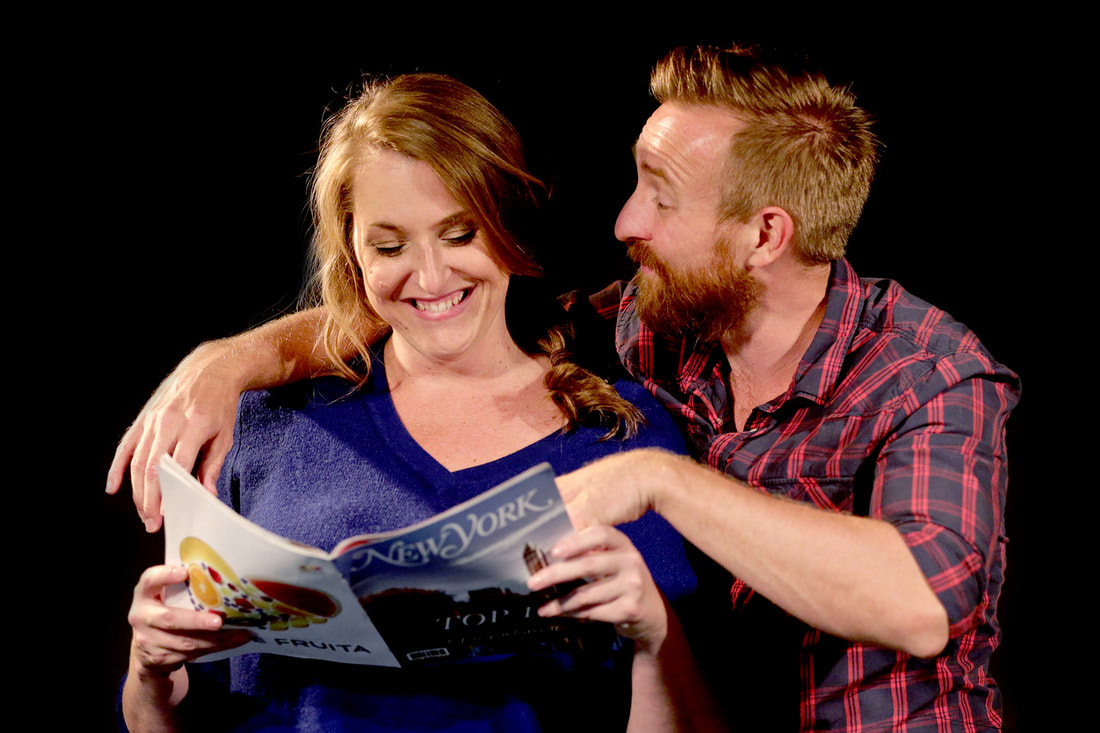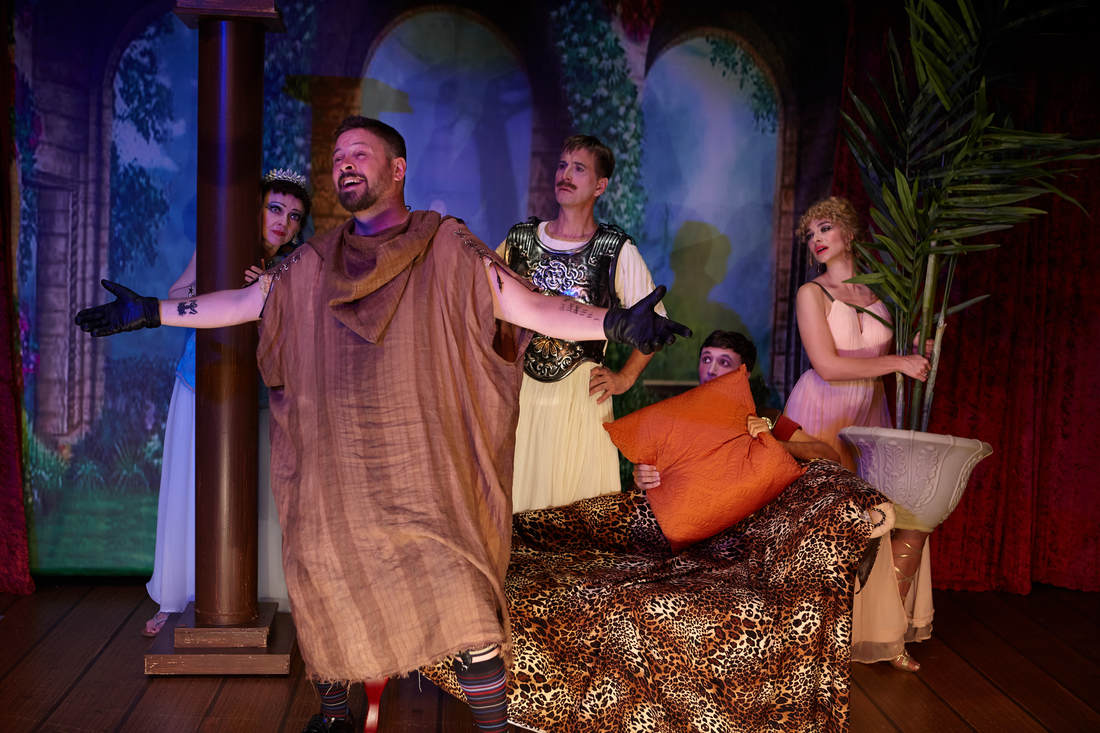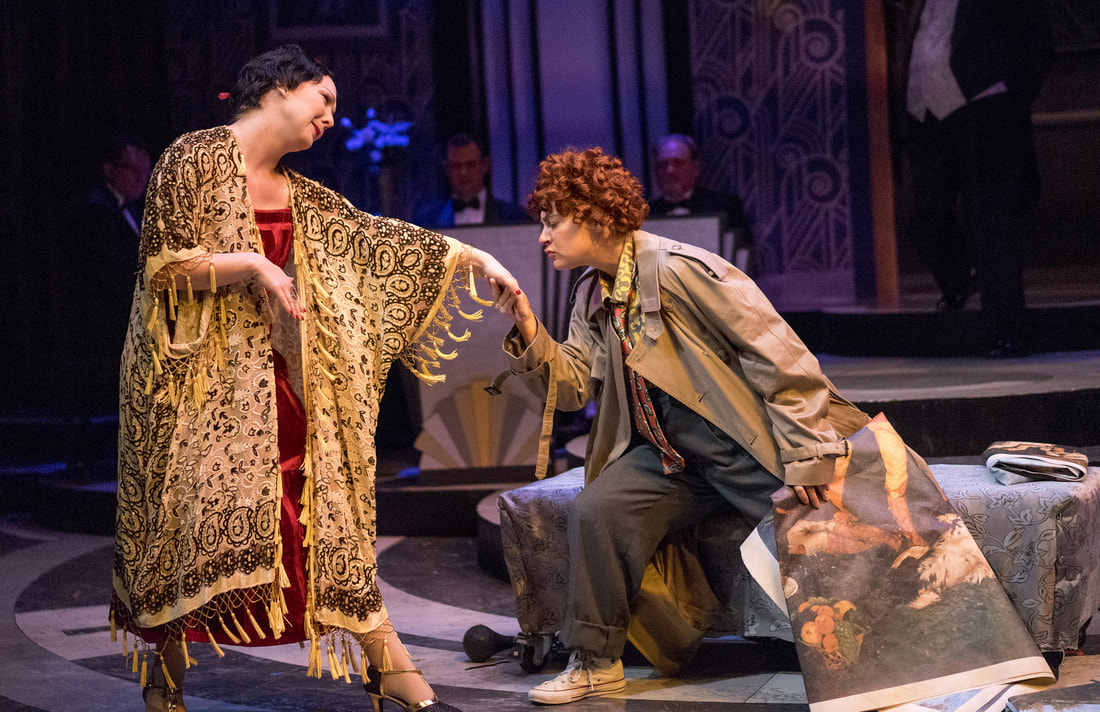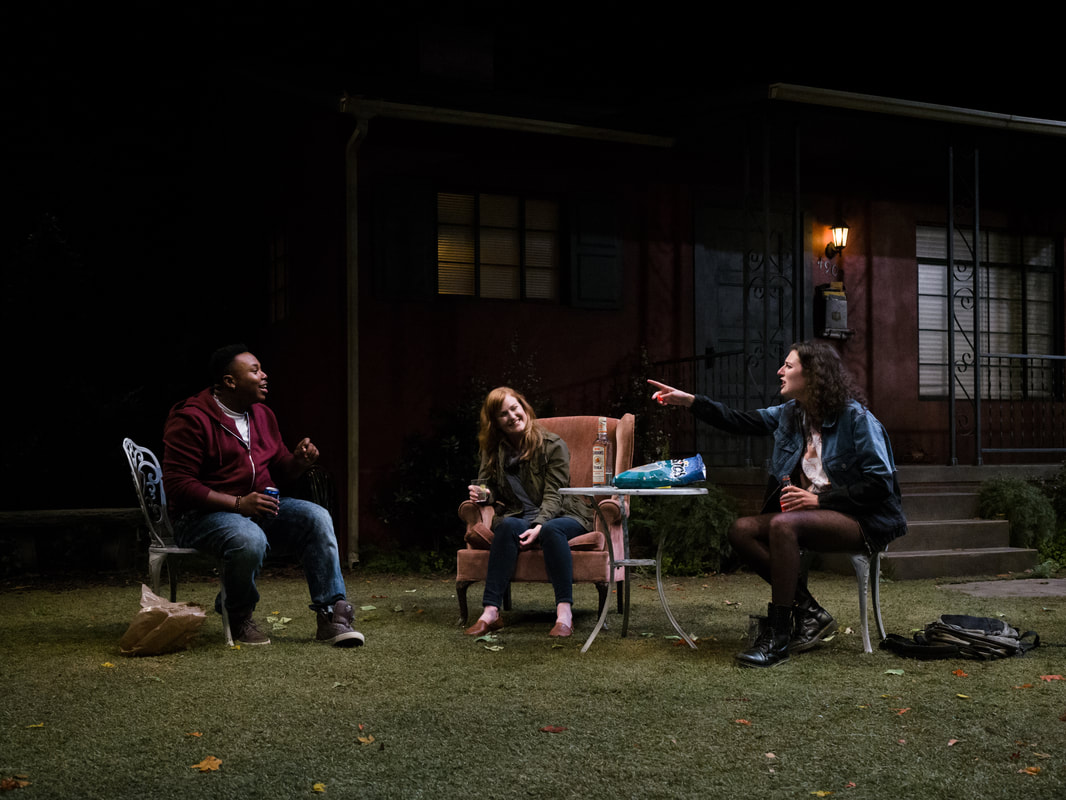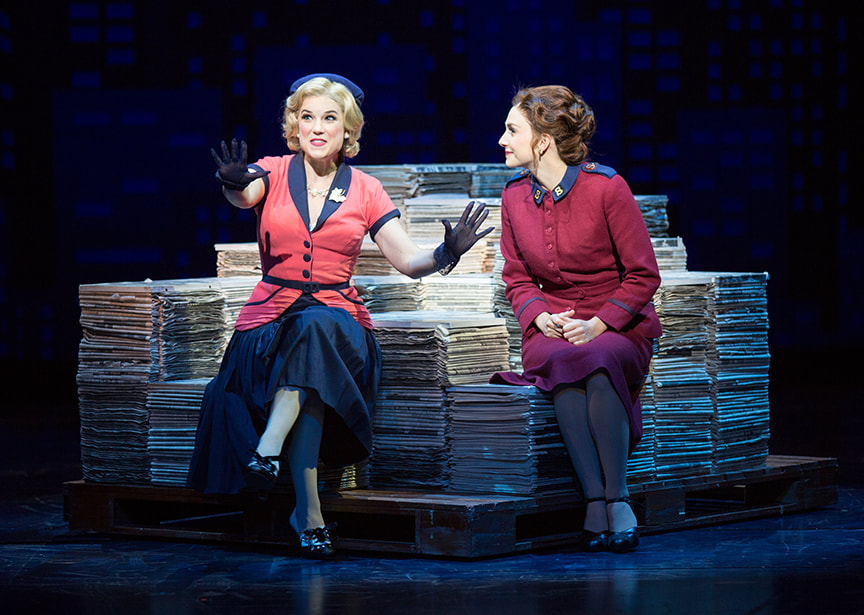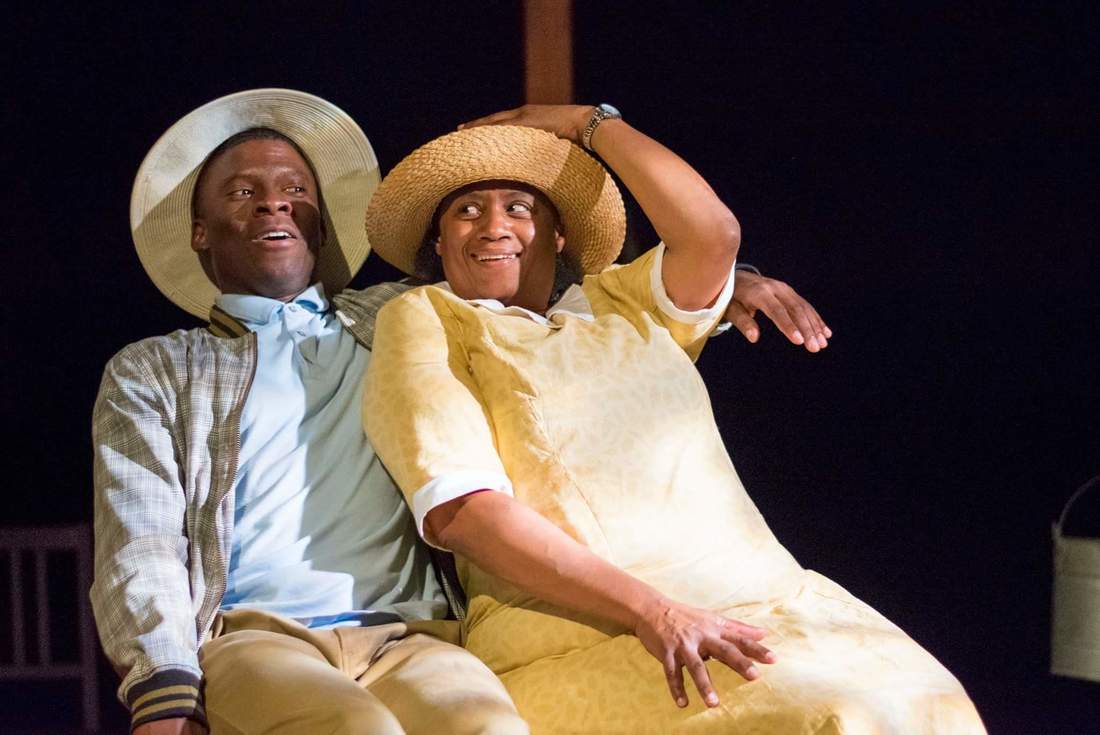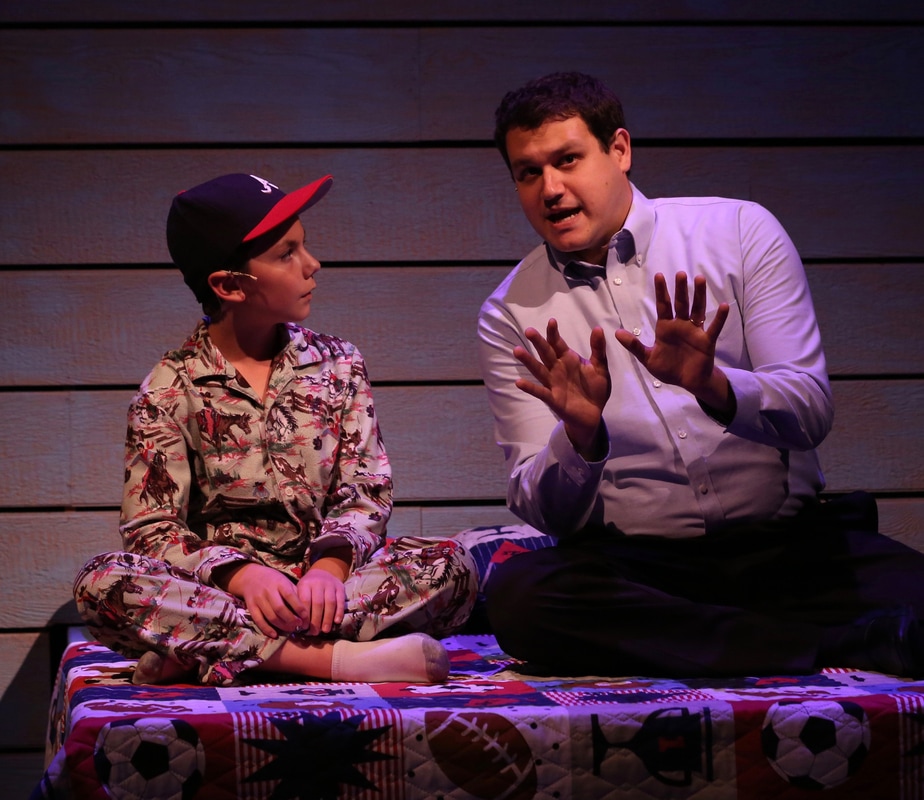|
Kym Pappas and Brent Roberts in "Ordinary Days." Photo by Adriana Zuniga-Williams What’s most extraordinary about InnerMission Productions’ staging of Adam Gwon’s chamber musical “Ordinary Days” is how director Matthew E. Graber and a cast of four create the illusion of Manhattan, in all its bustling humanity, in confines the size of a freight elevator. But rather than being an impediment, Diversionary Theatre’s little Black Box space proves an effective conduit between cast and the closely seated audience, facilitating an emotional connection with “Ordinary Days’” searching characters and its I-Love-New York backdrop.
Two tales of doubt and personal identity unfold at the same time, though never together, in this 18-song, 90-minute affair which is getting its San Diego premiere. Deb (Jamie Channell Guzman) is a harried graduate student who, to her horror, has lost on the subway the notes to her dissertation. That she can spew a complicated drink order to a Starbucks barista without taking a breath speaks to her manic disposition. By contrast, the good-natured guy Warren (Patrick Mayuyu) who finds and returns her notebook seems, at first blush, positively zen, encouraging Deb to see the “big picture.” But Warren, who cat-sits and hands out aphorism-graced fliers for an unseen artist, knows in his heart that life holds more in store for him. The heart and its uneasy slow-dance with love defines Claire (Kym Pappas) and Jason (Brent Roberts), who have moved in together and found their relationship wanting. Incurably romantic Jason wants what evasive Claire can’t seem to give him. He does not know of a terrible loss in her past, one that Gwon’s 5-year-old musical reveals in a moving two-song climax (“Falling,” “I’ll Be Here”) that will make your throat tight. Here, “Ordinary Days’” other “character” – New York City – is evoked in the memory of the darkest, least ordinary day in its history. Mayuyu is likable and sympathetic as Warren, who in spite of his restlessness, seems most at home in the big city. Guzman impresses with her knack for the machine-gun pace of Gwon’s lyrics for Deb. Pappas and Roberts bring home with tenderness the dissonance of their romance, particularly in Roberts’ yearning ballad “Favorite Places.” “Ordinary Days” is the first-ever musical for co-artistic directors Pappas’ and Carla Nell’s 12-year-old InnerMission Productions. On a technical level, it works for the most part. Musical director Hazel Friedman accompanies the cast on piano, and in the closeness of the Black Box space, acoustics is a non-issue. At times, such as when one of the characters is singing alone, the static image of a studio audition may come to mind. But playwright Gwon’s revealing and often clever lyrics enliven solos like Guzman’s “Dear Professor Thompson” and “Calm,” or Mayuyu’s “Life Story.” And during numbers in which all four actors are onstage and in full ensemble voice, you’d swear there was more than a piano supporting them. Ultimately, “Ordinary Days’” emotive potency, which inhabits then transcends the fates of its four New Yorkers, requires no more than a keyboard’s minor chords and the intermittent crescendos that accompany life’s unforgettable moments. (Review originally published in San Diego Union-Tribune on 7/30/17.)
0 Comments
Richard Baird (forefront) in "At This Evening's Performance." Photo by Aaron Rumley Right off the bat, playwright Nagle Jackson should have second-guessed himself when he titled his ‘80s comedy At This Evening’s Performance. It’s not what you’d call a grabber. Alas, neither is the play itself, which under the direction of Andrew Barnicle closes North Coast Repertory Theatre’s 35th season. There is certainly potential for hilarity in the set-up: a contentious theater troupe in the mythical European nation of Strevia is forced to perform “the classics” at the behest of the oppressive party in political power. Toss in the threat of the assassination of someone in the cast, and you’re all set, right? But the guffaws and gesticulations exhaust themselves early in the going, and we’re left with what feels like a script Mel Brooks might have rejected as not nearly clever enough. Within the dutiful seven-person ensemble, only Richard Baird as a scowling stage manager fits into the spirit of what playwright Jackson apparently intended: physical, unadulterated farce. (Review originally published in San Diego CityBeat on 7/26/17)
Lauren King Thompson (left) and Samantha Wynn Greenstone in "Animal Crackers." Photo by Daren Scott It’s supreme silliness and comic anarchy when the Marx Brothers (Groucho, Chico, Harper and to a lesser extent Zeppo) are center-stage in Animal Crackers, the 1928 musical that became a beloved film two years later. When they’re not center-stage and instead the action turns to tap dancing and handsome couples in love crooning to each other, Animal Crackers loses its crunch. Back in the late ‘20s, when audiences gobbled up things like tap dancing and cute crooning, the charm most likely never waned. As Cygnet Theatre’s current production of Animal Crackers doesn’t intend to suggest but surely does, times have changed.
Josh Odsess-Rubin’s Groucho, Spencer Rowe’s Chico, Samantha Wynn Greenstone’s Harpo and Bryan Banville’s Zeppo (the “serious” one) ignite constant hilarity during this long-winded show (Act One alone is 80 minutes). And Melinda Gilb in particular provides amusing support as a flustered foil, but much of Animal Crackers (more so than in the 97-minute movie) turns wearying with its incidental “plot” and the drawn-out devices that seek to hold it together. (Originally reviewed in San Diego CityBeat 7/26/17) :Left to right: Marcel Spears, Heidi Armbruster and Brenna Coates in "At the Old Place." Photo by Jim Carmody Home is where the pity party is. Or so it goes for Angie, a woman of creeping middle age who awash in doubts and self-recriminations abandons her career and her husband and retreats to the empty home in Virginia left behind by her recently passed mother --with whom, of course, she has long been estranged. That estrangement is just a percentage of the psycho-emotional morass in which Angie finds herself. In Rachel Bonds’ At the Old Place, a world-premiere production at La Jolla Playhouse directed by Jaime Castaneda, the sort of internal crises and personal assessments Angie (Heidi Armbruster) confronts have been dramatized many times before, by many writers across multiple mediums. Bonds’ narrative twist, and what separates her play from an 80-minute wallow, is the presence of two fun-loving young people, each troubled in his/her own way, who bring to the surface the emotion that At the Old Place otherwise lacks and which Angie seems unable to harness.
Will (Marcel Spears, in a very natural performance) and Jolene (Brenna Coates) have been hanging out on the front lawn of Angie’s mother’s house long before she arrived on the scene. Jolene thrives on f-bombs and spiked Coke, but she really is a vulnerable soul. Will, sensitive and even more vulnerable, is the most likable – the only likable? – character in the story. But each manages to affect Angie to the point that she girds herself to make an assured decision about her life and her future. (The play’s other character, a colleague of Angie’s from the college where they teach with whom she’s been in a relationship, makes one appearance – “courting” her intellectually as only a dyed-in-the-wool academic can.) For all its angst emanating from central figure Angie, At the Old Place is at times frustratingly low key. Its liveliest scene might be the drinking game she, Will and Jolene play, even if it feels like Aunt So-and-So trying to fit in with the kids. One undeniable: the family house designed by Lauren Helpern, with its wide front porch, pitched roof and lemon-yellow light aglow in the windows, is so warm and homey you’ll long to move right in – even if it means spending some time trying to cheer Angie up. (Review originally published in San Diego CityBeat on 7/19/17.) Veronica J. Kuehn (left) and Audrey Cardwell in "Guys and Dolls." Photo by Jim Cox The dolls steal the show in the Old Globe Theatre’s gaily boisterous production of Guys and Dolls, staged in association with Sarasota, Fla.’s Asolo Repertory Theatre. As the principled missionary Sarah Brown, Audrey Cardwell (the most talented singer in the enormous cast) demonstrates a stirring operatic voice yet also shows she has comic chops in Sarah’s one unbuttoned scene – the dancing that becomes brawling on her and gangster Sky Masterson’s (Terrence Archie) quickie trip to Havana. Then there’s Veronica J. Kuehn as Miss Adelaide, long-suffering fiancée to crap-game organizer Nathan Detroit (J. Bernard Calloway). With the character’s squeaky vocal mannerisms and the beneficiary of the script’s choicest one-liners, Adelaide is a can’t-miss role, and the endearing Kuehn doesn’t miss. Not only that, her second-act-opening “Take Back Your Mink,” which finds Kuehn clad in a barely-there costume (one of the many perfect inspirations of designer Brian C. Hemesath), truly puts the hot in the Hot Box – the club at which Adelaide performs.
Though it dates back to 1950 and has seen countless productions since, Guys and Dolls is to this day a lovable show. Frank Loesser’s tunes – “Luck Be a Lady,” “The Oldest Established” (Nathan’s theme) and “Sit Down, You’re Rockin’ the Boat,” among them – are perennial audience pleasers. So are the show’s overdrawn but delightful characters inspired by the short stories of Damon Runyon. At the Globe, Calloway (the Globe’s Grinch the last two holiday seasons) comes up a winner as the hapless, good-hearted Nathan Detroit, as does Todd Buonopane in the plum supporting role of Nicely-Nicely Johnson. Josh Rhodes, who previously directed Baskerville: A Sherlock Holmes Mystery and choreographed Bright Star at the Globe, does double duty here, and though this is a long show with a couple of throwaway numbers, it never loses its big, Broadway fun. Lee Savage’s scenic design, too, is versatile and evocative of an old New York of neon, crayon colors and the nattily attired. A point of full disclosure: Guys and Dolls is a personal favorite. ‘Even liked the ’55 movie with Brando as Sky Masterson. Cortez L. Johnson and Portia Gregory in "The Ballad of Emmett Till." Photo courtesy of ion theatre From the moment he came into the world “feet first” as the result of a breech birth, Emmett Till wanted to stand up, his mother recalls early in Ifa Bayeza’s powerful play. How the African-American boy affectionately called “Bobo” left the world at only 14 years old shocked the nation in 1955 and set off reverberations in the civil rights movement. Yet the lynching of this boy who from the get-go wanted to be a man doesn’t tell the entire story of Bayeza’s “The Ballad of Emmett Till,” which is having its San Diego premiere at ion theatre in Hillcrest. The lyrical one-act play is also a celebration of Emmett’s lives: the one he lived all too briefly with such unabashed energy, and the one he might have lived, which endured in the memories of those who loved him.
Bayeza’s 2008 work chronicles the story of Chicago-born Emmett’s visit to his great-Uncle Mose’s Delta-town farm in Mississippi and ultimately an encounter in a grocery store that would precipitate the teenage boy’s kidnapping and murder, terrifyingly dramatized on the small ion theatre stage. This version of “The Ballad of Emmitt Till,” co-directed at ion by Yolanda Franklin and Claudio Raygoza, features a six-actor ensemble, Bayeza’s scaling down of her original 13-character piece. Five of them (Dwaine Collier, Rhys Greene, Portia Gregory, Tamara McMillian and Grandison Phelps III) play multiple roles, with Cortez L. Johnson, seen earlier this year in Moxie Theatre’s charged “Blue Door,” portraying Emmett. It’s a cohesive group occupying tense proceedings that are always in motion. Throughout the production they join in uplifting, spiritual song that in its passion testifies to the deep intertwining of those in Emmett’s life and their commitment to survival. Emmitt, a young man with a stutter and an endearing guilelessness, proudly arrives at his great-uncle’s farm wearing his Panama hat and white bucks. He is wholly unprepared for arduous chores like picking cotton and plucking chickens (both amusingly re-created). It’s his very innocence about the suffocating atmosphere of hate nearby (“Be respectful,” “Don’t speak to white folk,” he’s cautioned) that turn his adventure away from home to terror. The adult Johnson may not look like a 14-year-old, of course, but he effectively inhabits the naivete and unshakeable will of this one, who out loud can’t believe that God will let him die. The last half-hour of this 95-minute production is the most gut-wrenching for an audience. The abduction of Emmett, and even more so the dramatized trial in which the boy’s mother recounts trying to identify her son after his mutilated body was found in the river, are frank and graphic. (Emmett’s mother insisted on an open casket to ensure that the horror of her son’s murder of hate be understood.) But as Emmett’s presence stands tall over those left behind at play’s end, notes of hope resonate: for justice, for immortality, and, in Bayeza’s words, for “a new world.” (Review originally published in San Diego Union-Tribune on 7/10/17.) Brandon Joel Maier (right) stars in Lamb's Players Theatre's "Big Fish." Photo by Ken Jaques Everything about Big Fish is, well, big: The number of characters. The number of costume changes. The number of songs in the musical score. The climax, which packs a big emotional punch. To some extent, Big Fish is too big for its theatrical britches, frolicking on and on long past when it probably should end. It’s an audacious affair, packing into one show high school cheerleaders, a giant who lives in the forest, a traveling circus, the Old West, a small-town flood, and the fraught relationship between a father and son. Yet Big Fish – served up for audiences in multiple mediums and multiple iterations – has won hearts. The 2013 stage musical written by John August, with music and lyrics by Andrew Lippa, is based on the 1998 Daniel Wallace novel “Big Fish: A Novel of Mythic Proportions” and a 2003 Tim Burton movie (written by August), which was very cool. Now we get at Lamb’s Players Theatre a leaner “12 Chairs” version of the musical, with half the size cast of the production that was mounted two years ago in Vista on Moonlight Amphitheatre’s larger stage, and some paring of narrative.
Besides the wondrous costume design of Jeanne Reith (to a significant extent, the star of this show), it’s Brandon Joel Maier in the lead role of Edward Bloom who buoys this Big Fish, directed by Deborah Gilmour Smyth. It’s Bloom’s signature songs (“Be the Hero,” “How It Ends”) soulfully rendered by Maier that rise above what can be at times silly in this tale of how a quirky dad’s fish stories alienate then ultimately endear him to his upwardly mobile son (Michael Cusimano), an expectant father himself. Among the cast members playing multiple roles John Rosen has big fun whether as a solemn family doctor or a ringmaster/werewolf (not making that up, by the way). As Edward Bloom’s loving wife, Sandra, Kelsey Venter is as warm as her balladry. Cusimano is just fine as the principled son, too. Two Big Fishes in two years is enough already for San Diego County theater audiences, however. It’s a good show – not a great show. For a story dealing in large part with our mortality, Big Fish on the stage is unashamedly and joyfully alive. (Review originally published in San Diego CityBeat on 7/5/17) |
AuthorDavid L. Coddon is a Southern California theater critic. Archives
July 2024
Categories |
David Coddon |
|
